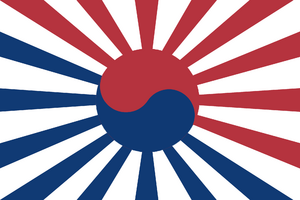Taoist Armed Forces
| Taoist Armed Forces | |
|---|---|
| タオ武装勢力 Tao busō seiryoku | |
 Armed Forces' Ensign | |
| Founded | 1928 |
| Current form | Active |
| Service branches | Imperial Taoist Army Imperial Taoist Navy Imperial Taoist Air Force Imperial Taoist Coast Guard |
| Headquarters | Nashito, Nashito Province |
| Website | imperialarmedforces.mil |
| Leadership | |
| Commander-in-Chief | Sora Miroyu |
| Royal Military Advisor | Riko Kyou |
| Royal Commander of the Imperial Armed Forces | Kenshin Sho |
| Personnel | |
| Military age | 18 |
| Conscription | 12 months |
| Available for military service | 28,740,852 males, age 15–49, 29,121,349 females, age 15–49 |
| Fit for military service | 26,441,583 males, age 15–49, 15,943,557 females, age 15–49 |
| Reaching military age annually | 1,480,000 males, 1,492,000 females |
| Active personnel | 723,792 |
| Reserve personnel | 2,439,600 |
| Deployed personnel | 3,000 |
| Expenditure | |
| Budget | ₩178,600,792,480 |
| Percent of GDP | 3.48% |
The Empire of the Tao Armed Forces, commonly referred to as the Taoist Armed Forces and Imperial Taoist Armed Forces, are the unified military forces of the Empire of the Tao which were established in 1928, and are controlled by the Royal Department of Defence. In recent years they have been engaged in international humanitarian efforts and participated in a domestic civil uprising in 2017.
History
1863-1947 (1st Empire)
On February 19, 1863, Emperor Shingo had entered into a war of succession against the Englean Kaiserreich. During this time, Emperor Shingo was responsible for establishing the Imperial Taoist Armed Forces, the Imperial Taoist Army, and the Imperial Taoist Navy.
In 1914, the Empire joined the Allied Powers in World War I, as the Armed Forces occupied several Ventismarian Colonial states in Ophion.
1948-2018 (UST)
After World War II, the Empire of the Tao was split up into multiple occupation zones, the main ones being controlled by the Englean Kaiserreich and Rhodevus. These zones would last into 1948 and during this time the nations controlling the zones were responsible for the defense of the Tao until the government of the United States of the Tao was fully organized.
2019-present (2nd Empire)
On May 16, 2019, Sora Miroyu, the Prime Chancellor at the time, had constitutionally dissolved the House of Chancellors and was coronated as Empress of the Tao. With the Empire of the Tao having been restored, the Branches of the military were renamed, but few changes to the daily operations of the Armed Forces were made.
Structure
The Empress is the Commander-in-Chief of the Taoist Armed Forces and is the highest authority in the Armed Forces.
The Royal Military Councillor is the highest authority in all military matters, aside from the Empress, and is appointed to the position by the Empress. The Royal Military Councillor is assisted by the Royal Military Advisor, who is also appointed by the Empress. These two positions primarily advise the Empress on defense matters, such as appointing the head commanders in each military organization and proving estimations on domestic and international military capabilities.
One of the only large changes when Empire was restored on May 16, 2019, was the addition of one person of military personnel being appointed as the Royal Commander of the Imperial Armed Forces. This person acts as an operational coordinator, collecting information and meeting with the head staff of each branch to create military plans on the largest national scale. While they have considerable power over each of the branches, most daily administration and planning is reserved for each branch's Royal Commander.
Contoversy
EMP development program
On August 7th, 2017, the United States of the Tao began testing of a new ship-launched EMP device, which had the potential to wipe out all electronics within a 20-mile radius, just 400 miles off the coast of Sunrisia. The test was ordered by the short-lived nationalist-lead government and attracted condemnation from many nations around the world, including countries like Rezua, and Pantorrum.
Uniforms & Insignia
Ground Forces
The arm of service to which members of the ground forces are attached is indicated by branch insignia and piping of distinctive colors: for infantry, red; artillery, yellow; armor, orange; engineers, violet; ordnance, light green; medical, green; army aviation, light blue; signals, blue; quartermaster, brown; transportation, dark violet; airborne, white; and others, dark blue.
The arm of service to which member of the naval forces are attached is indicated by branch insignia and headwear bands: for command, Black; marines, violet; engineers, orange; ordinance, red; cyber warfare, maroon; aviation, light blue; communications, green; medical, aqua; fire crew, dark blue; transportation, brown; maintenance, white; flag signals, bright orange; others, tan.